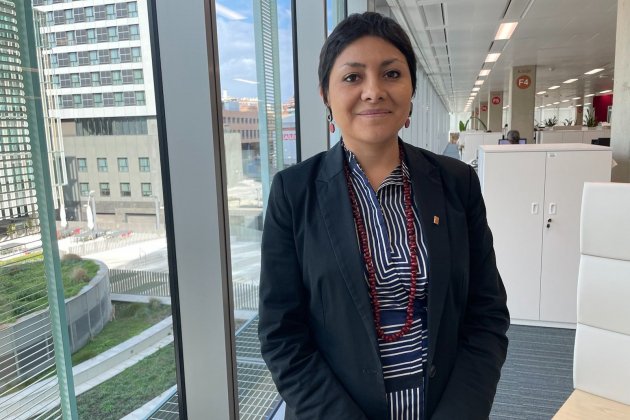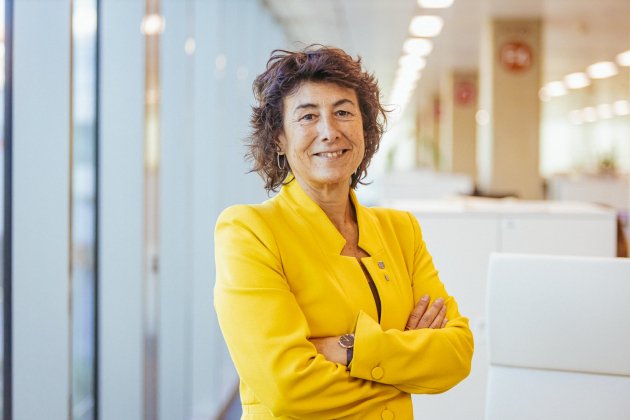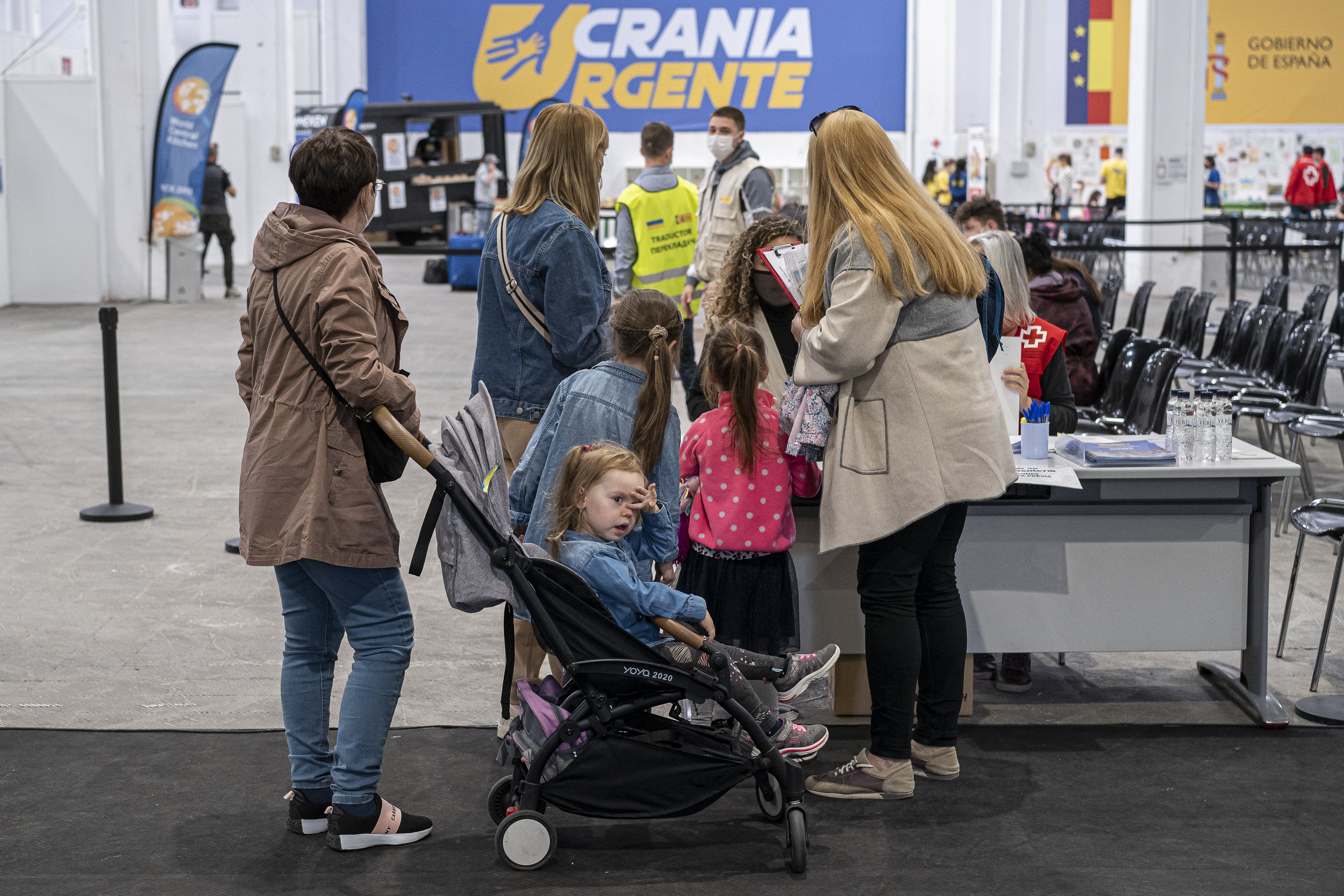Since February 24th 2022, when the Russian invasion of Ukraine began, millions of Ukrainians have fled the country to escape the war. The latest count by the United Nations calculates that there are more than 7.9 million Ukrainian refugees who have left their country, with the majority dispersed across Europe, and Poland and Germany being the two European countries that have welcomed the most refugees. However, thousands of Ukrainian refugees have ended up in other European territories, including Catalonia, which became a major gateway for Ukrainian refugees arriving in the Spanish state. One year on, many thousands of refugees have now settled in Catalan territory. Mireia Mata, Catalan secretary of equality, states that since June last year, the total number of people who have settled in Catalonia has stabilized at around 21,000.
On March 14th, 2022, the Spanish government announced that the Fira de Barcelona trade fair centre would be one of three places where reception centres for Ukrainian refugees would be located. Precisely for this reason, many refugees first arrived in Catalonia and later moved on to other parts of the state. Thus, a large number of people arriving from Ukraine - around 36,000 - obtained their initial temporary protection status here. "From the end of February to the end of June we noticed a progressive increase up to 22,000 refugees and from June until now the total in Catalonia has stabilized at around 21,000", explains Mata.
Graphic: Ukrainian refugees in Spain and the communities where they have received initial protection
In the early days of the war, when the wave of Ukrainians fleeing the conflict reached Catalonia, it was impossible to make predictions about how the situation would evolve. However, despite the Catalan government's incertainty, local administrations and social organizations responded quickly to this new scenario. Not only at that time, but providing support which still continues. In the Catalan administration, this responsibility has been handled by the ministry of Equality and Feminism, which has taken charge of managing and resolving incidents throughout the reception process, work which it continues today. "We've had a good response", says Eunice Romero, director general of the Migrations, Refuge and Anti-racism area. Both Romero and Mata note that managing the mass arrival of refugees from Ukraine has been a challenge, but emphasize the involvement of civil society and local bodies. Romero emphasizes: "It's a job shared by several departments, the local community world has been doing a very important initial job and we want to help them with a subsidy that we're about to resolve."
Graphic: Which countries have welcomed most Ukranian refugees?
The European directive that shows another model is possible
The European Union's response to the large diaspora of Ukrainian refugees has not been adopted in other more recent conflicts such as the war in Syria. Ukrainian citizens went through a difficult path in seeking refuge in other states, but faced fewer barriers than other refugees. All of this is due to the European protection directive passed on March 4th, 2022, which "provides immediate and collective protection to displaced persons" and seeks to "relieve pressure on the national asylum systems of the countries of the EU", according to the European Council. This had been launched once in the past, in 2001, "because of the armed conflicts in the Western Balkans, in particular from Bosnia and Herzegovina and Kosovo".
"The directive creates a fast lane in the bureaucratic route", exemplifies Romero, who explains that "there is a hyper-bureaucratization of the lives of foreign people in general, both refugees and migrants". The extensive and grueling routes that other people have to face when they seek refuge in Spain are greatly eased in the case of the Ukrainians. "It is ideal that they are able to register and immediately have a health card and work permit and even register for social security", Romero says, although she regrets that "all of this is unthinkable for other refugees". Despite everything, the director general of Migrations, Refuge and Anti-Racism points out that the directive is showing that another model with fewer barriers is possible. The directive is intended to be valid for a maximum of three years, whether it will be renewed or extended will depend on the situation and the evolution of the Russian invasion of Ukraine.
The profile of the refugees from Ukraine
"There is a high percentage of adults with education and training, as well as a large influx of women, often with children. It is the mothers who lead the way," explains Romero. So, the profile of refugees in Catalonia is that of a woman with higher education and children. This is a profile that is repeated in many countries, since it must be remembered that at the beginning of the war, the Ukrainian government forbade men between the ages of 18 and 60 to leave the country because they were to be be recruited into the fight against the Russian invasion.

Eunice Romero, director general of Migrations, Refuge and Anti-Racism. Photo: Ministry of Equality and Feminism
In fact, bearing in mind this refugee profile, the Catalan ministry asserts the need to attend to these people by introducing a gender perspective. "The gender perspective has been key", underlines Romero. In the actions of refugee reception that have been organized, services have focused on the needs and dangers faced by women in war contexts, for example, falling into networks of human trafficking or sexual violence. "We have been able to create space for special care for women who may be victims of sexist violence who were fleeing not only the war but also the sexual crimes that it entails," remarks Mata. It should be remembered that since 2009, the UN has recognized sexual violence, the vast majority of which is suffered by women, as a tactic of war.
The gender perspective has not only been addressed in terms of violence, but also in the care given. Both Mata and Romero give the example of the Temps per Cures program - "Time for Care" - which aims to provide child and other care services to free up time for families - especially for women, who are the ones who take responsibility, for the most part, for the care work and can use that time for training or whatever is needed. Mata reflects: "Unfortunately, the two major humanitarian crises we have experienced since May 2021 have shown the importance of the gender perspective, the first being Afghanistan and the second Ukraine".
Coordination between Spanish and Catalan authorities: problematic
Although the Catalan ministry has a positive assessment of how the reception of thousands of Ukrainian refugees was handled, there is indeed a major criticism: the coordination with the Spanish state. Or rather the lack of it. "The state does not generate space for co-decision that we would like", regrets Romero, who points out that the unilateral decisions of the Spanish state have affected the reception process, as for example in the territorial distribution. "The state decides in which municipalities the resources will be dedicated. This has an impact, people can end up taking root in a place where they might not want to if there had been coordination between the two levels of administration," she explains, referring to the hotels which were enabled by the Spanish government.

Mireia Mata, secretary of Equality. Photo: Ministry of Equality and Feminism
"With the Spanish state, we have always asserted the possibility of managing the resources for refugee reception, there are several court rulings that support our competences in the matter of reception. The trap we have found is when we have the competences but not the money. The state does not let go of these financial resources," explains Mata. The Catalan government has been very vocal in recent months about the shortcomings of state management, especially with regard to financial resources. Already in May, the Catalan minister for Equality and Feminism, Tània Verge, criticized that the state had not transferred "a single euro" for those Ukrainian refugees who were not covered by the state plan, who, at that time, were 72% of the refugees from the Ukraine conflict.
The "other 'Ukraines'"
"I think that the great lesson can be taken is that we all reflect and see that there are many people who come from many Ukraines in the world who do not appear on television and to whom we should give the same treatment", says Mata. Refugees typically face many more barriers on their way to a safe country. The large number of people who have sought refuge from Ukraine, and the European directive, among other aspects, has made this situation exceptional, but at the same time shows that other ways of reception are possible, as Romero points out. "If we open our arms, doors and hearts to the people of Ukraine why don't we do the same to the people of Sudan or those fleeing the violence of Latin America?" asks Mata.

